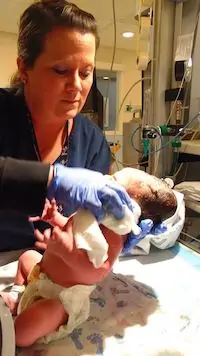The moments following your baby’s birth are full of emotions, and you might wonder what happens during the newborn care immediately after birth. While you are busy celebrating your new child’s birth, the hospital staff still has a lot to do and has to ensure that everything is okay with your baby.
For the first 24-48 hours after birth, a lot has to happen with you and your baby. It’s best to speak to the hospital staff before you have a baby about their procedures and what could vary based on parents’ wishes. Most hospitals are flexible and can move things depending on what the parent wants. Remember, this is your baby!
Here is a general idea of what care your newborn receives after birth.
What Happens to a Newborn Immediately After Birth?
These are some of the most exciting moments for parents; they get to see their baby for the first time! At the same time, your doctor and the nursing staff provide care to ensure he is stable and healthy.
Here is what happens in the hour or two following birth:
Cut The Umbilical Cord

The umbilical cord is the last thing that stands in the way of life in the new world. It played a vital role in your baby’s formation and growth over the previous 40 weeks, but now that she is born, they don’t need it anymore!
Your OBGYN will clamp the cord, and typically, they offer this job to the labor partner. If your partner doesn’t want to cut the cord, your doctor will quickly do so. It’s normal for doctors to wait up to 60 seconds after birth to cut the cord, which lets the blood from the placenta go into your baby. This practice is called delayed cord clamping, and it has several significant benefits.
Breathing Assistance
Even if your baby is born full-term, mucus ends up stuck in your baby’s nose and mouth, making it hard to take his first breath. They use a suction tool to remove the mucus, and they might rub his back as well. Babies cry at birth, and it’s normal!
Test Your Baby’s Apgar Score
The staff checks your baby’s Apgar score, typically at 1 minute after birth and 5 minutes. It helps them determine how well your baby is adjusting to his arrival Earthside. Here’s what Apgar stands for and what they want to see:

- A – Activity. The doctor wants to see the movements your baby makes and his muscle tone.
- P – Pulse. Your baby’s heart rate will be checked multiple times after birth. A good, healthy heart rate is more than 100 beats per minute for a newborn.
- G – Grimace. How does your baby react to things being done. Your doctor will put a bulb syringe in your baby’s nose, and watch to see his reaction. Does he get upset or sneeze?
- A – Appearance. Doctors want to see a nice pink color for his skin color. Sometimes, they’re pale or blue at birth, but that’s why your doctor will check again shortly after birth.
- R – Respiration. The nursing staff will watch his breathing, checking his average respirations per minute, and listening for strong cries.
Each section receives a score between 0-2, and the numbers are added together. A perfect score is 10, but most babies score between 7-9. Seven is considered a healthy Apgar score.
What Happens If My Baby Has a Low Apgar Score?
Don’t stress too much just yet. Some babies need more time to adjust than others, and difficult labor can result in a low score.
A low Apgar score could require more medical attention or some time in the NICU. It could be as simple as receiving some oxygen or needing more help if they have heart or lung issues.
Measure Height & Weight
Soon after birth, one of the nurses will take your baby to measure his height and weight. They also check his head’s size to ensure it’s in the correct range for a healthy baby. Everyone loves seeing what their baby weighs at birth, so this is an exciting moment!
Check Body Temperature
Babies have trouble regulating their body temperature after birth, so your baby’s temperature will be taken several times after birth. Sometimes, your baby might need to be kept on your chest for a while under heated blankets to ensure she stays warm.
Take Footprints and Get Medical Bracelets
You might not even realize that this happens, but your baby’s footprints are taken for medical records. Your baby is given two bracelets – one for his ankle and one for his wrist – for identification and security purposes. You are given matching bracelets, along with your partner.
Eye Drops & Vitamin K Shot
While these are considered optional, it’s highly recommended that you give both of these to your newborn. Your child won’t make his own vitamin K for several days, so giving the shot help his body make blood clots, and it also prevents serious bleeding problems from developing.
Soon after birth, the nurses will use antibiotic eye drops or ointments that prevent eye infections from developing from vaginal birth. This doesn’t need to happen immediately; it can wait!
When Can I Hold My Baby After Birth?
Evidence shows that skin-to-skin is vital for your baby’s health, so providers want you to hold your baby as soon as possible after delivery.
When you have a vaginal birth, your doctor will place your baby on your chest and cover you with a blanket immediately after birth. If you have a c-section, it does depend on the hospital and their policies, but you can either have skin-to-skin in the operating room or the recovery room as soon as the surgery ends.
Do Babies Breastfeed Immediately After Birth?
Yes! Your baby’s instinct is to look for the breast, so don’t be surprised if your baby starts to root quickly after birth. You can begin to breastfeed as soon as you want; it’s recommended that you do so without the first hour after birth.
What Happens in the First 24 Hours After Birth?
You have plenty of time to spend with your baby after all of the initial care is provided. Over the next 24-48 hours, depending on your hospital’s policies, the staff has some testing that needs to be provided.
Here’s what to expect before your discharge from the hospital.
Hepatitis B Virus Vaccine
While also considered optional and often delayed for several months, the hospital will offer you the hepatitis B vaccine for your baby.
Newborn Screening Tests
The staff will perform a simple blood test that checks for different rare, genetic, and hormone-related conditions. Each state does offer various tests, and it often takes several weeks for the results to come back.
At the same time, your baby will also have a hearing test performed. It checks to ensure your child’s hearing is operating correctly. If he doesn’t pass, don’t worry too much just yet. Fluid often comes trapped in their ears whenever they’re born, and it might need more time to come out.
Here are just a few of the disorders and diseases the tests cover:
- PKU
- Maple Syrup Urine Disease
- Congenital Hypothyroidism
- Sickle Cell Disease
- Beta Thalassemia
- Cystic Fibrosis
- Spinal Muscle Atrophy
First Bath
You can opt to delay bathing if you want, but many hospitals offer to bathe your baby for the first time. Some parents prefer to do so at home. Make sure you tell the staff your wishes!
Circumcision
The circumcision rate is drastically dropping in the United States as more parents understand that the procedure is considered by most health experts worldwide, a cosmetic procedure. Some insurance companies are no longer covering the procedure and asking parents to pay for it out of pocket.
If you live in the United States, you will have the option to select circumcision at the hospital. It’s a parent’s decision, but this is typically not something offered if you live outside of the United States.
Does Newborn Care After a Vaginal Birth Differ From a C-Section?
If you’re having a c-section, you might wonder if the newborn care is different than what you would receive if you had a vaginal birth.
The same things are offered to your baby, but the timing might be different. Here are some things you might (or might not) notice.
- A baby’s nose and mouth are suctioned when he is removed, so unless you have a clear curtain, you don’t see that take place.
- Your baby will be measured, weighed, wiped down, a diaper put on, and wrapped up before being given to your spouse.
- If you have skin-to-skin in the OR, it’s typically after the weighing and measuring are completed.
- Some babies are brought to the nursery before going to the recovery room per hospital policies, which further separates mom and baby. Send your partner or request that your baby goes to the recovery room and not the nursery.
- You will stay longer, so they have a longer period to complete all of the screening tests.
Final Thoughts
A lot has to happen when it comes to newborn care immediately after birth, but they all have an essential job. The staff needs to make sure your baby is healthy and able to go home with you when the time comes. Soon, you’ll be home with your baby, and you can be confident that all is okay with your child.
Hey, this is Linda. My biggest accomplishment in life is being a mother of four children. Their current ages range from almost ten years old down to 20 months old.
I’m passionate about writing parenting articles because I understand so well all of the problems and trials you face as a parent. From breastfeeding woes to budgeting problems and behavior problems, along with everything in between, chances are I’ve faced it over the last ten years. Read more about Linda here.






